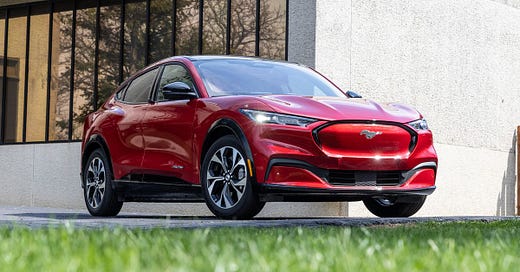Ford's Electric Vehicle Journey: A Costly Attempt to Rival Tesla
Ford's High-Stakes Gamble in the Electric Vehicle Market: A Tale of Innovation, Challenges, and the Quest to Compete with Tesla
Ford's Electric Vehicle Journey: A Costly Attempt to Rival Tesla
Tesla has long been the dominant player in the world of electric vehicles (EVs). However, traditional carmakers like Ford have been striving to carve out their own space in this rapidly evolving market. Ford's journey into the EV landscape has been marked by ambitious attempts to emulate Tesla's success, but these efforts have come at a significant cost(1).
Ford's Electric Aspirations and the High Price of Innovation
Ford's foray into the electric vehicle market was marked by the launch of the Ford Mustang Mach-E, an all-elective SUV, and the Ford F-150 Lightning, an electric version of its best-selling pickup truck. These vehicles were part of Ford's broader strategy to invest $11 billion into electric and hybrid vehicles by 2022, a move that was seen as a direct challenge to Tesla's dominance(1).
However, the road to electric innovation has been fraught with financial challenges for Ford. The company's electric vehicle development and production costs have soared into the billions, significantly impacting its bottom line. Despite these high costs, Ford's electric vehicles have struggled to match the popularity and sales of Tesla's models(1).
The F-150 Lightning: A Bold Move with Mixed Results
The Ford F-150 Lightning was a significant part of Ford's electric vehicle strategy. As an electric version of the best-selling pickup truck in the United States, the F-150 Lightning represented a bold move into uncharted territory. However, despite its innovative features and impressive performance, the F-150 Lightning has not been the game-changer Ford had hoped for(1).
Recent reports indicate that Ford has slashed the price of its F-150 Lightning trucks, including a 17% cut for the base model, in an attempt to boost its share of the EV market. This price reduction comes after Ford had previously raised Lightning prices earlier in the year, citing improvements in scale and battery raw material costs as reasons for the price cut(2).
The Impact of Tesla's Dominance
Tesla's dominance in the electric vehicle market has been a significant factor in Ford's struggles. Tesla's vehicles, led by the charismatic Elon Musk, have become synonymous with electric vehicles, making it difficult for other automakers to break into the market. Tesla's aggressive pricing strategy has also put pressure on other automakers, leading to a price war in the electric vehicle industry(3).
Looking Ahead: Ford's Electric Future
Despite the challenges, Ford remains committed to its electric vehicle strategy. The company has announced plans to triple the production capacity of its F-150 Lightning trucks, indicating a continued focus on electric vehicles. However, the high costs of electric vehicle development and the fierce competition from Tesla and other automakers mean that Ford's electric vehicle journey will likely remain challenging (3).
In wrapping up, Ford's venture to compete with Tesla in the electric vehicle (EV) market has proven to be a pricey undertaking. Despite the significant progress Ford has made in the development and launch of electric vehicles, the high costs associated with these initiatives and the fierce competition in the EV market have posed challenges to Ford's electric aspirations(4).
Ford's flagship electric vehicle, the Mustang Mach-E, has been a key player in the company's electric strategy. With a range of configurations and equipment packages, the Mach-E has been designed to appeal to a broad spectrum of customers. The car boasts impressive features such as a well-appointed interior, advanced tech gadgets, and a range of over 300 miles on a single charge. The GT Performance model can even accelerate from 0 to 60 mph in just 3.7 seconds(5).
However, the Mustang Mach-E's success has not been without its challenges. Despite winning the EV of the Year award in 2021, it has since lost its crown to the more affordable and equally impressive Hyundai Ioniq 5. Furthermore, while the Mach-E offers a range of between 226 and 312 miles depending on the model, this falls short of the ranges offered by some Tesla models(6).
Ford has also made efforts to improve the Mach-E's range and performance. In 2023, the company introduced new batteries for standard range models, promising to increase the EPA range and power for all-wheel-drive Mach-Es. The new technology has boosted the standard range all-wheel-drive Mach-E output to 311 horsepower(7).
Despite these advancements, Ford's journey in the EV market is far from over. The company continues to face stiff competition from established players like Tesla and emerging competitors like Hyundai. As Ford continues to navigate the electric vehicle landscape, it will be intriguing to see how the company adapts its strategy to compete in this rapidly evolving market.
Sources:
Lessons from Norway: Insights for the UK's EV Charging Infrastructure Development
Introduction As the world shifts towards a greener future, the adoption of electric vehicles (EVs) is becoming increasingly important. Norway, a pioneer in this field, has made significant strides in EV adoption and the development of its charging infrastructure. This article delves into the lessons the UK can learn from Norway's experience, drawing on i…








🤣🤣🤣🤣🤣🤣🤣🤣🤣🤣